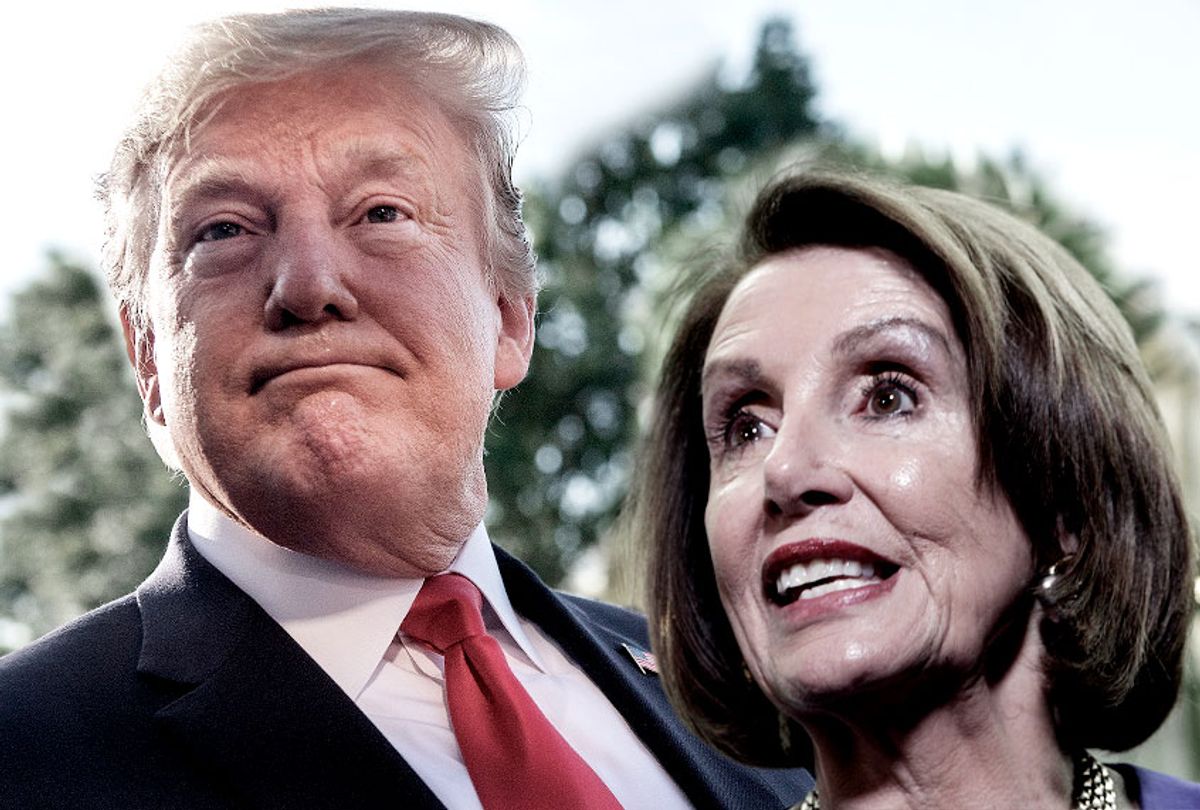Although House Speaker Nancy Pelosi is all in favor of aggressive investigations of President Donald Trump in the House of Representatives, she has maintained her opposition to impeachment — stressing that even if Trump were impeached in the House, he wouldn’t be convicted by a GOP-controlled Senate. Nonetheless, Pelosi has made it clear that she considers much of Trump’s behavior wildly unethical, and according to a report by Politico’s Heather Caygle, the speaker believes that Trump belongs in prison.
Pelosi has not publicly expressed a desire to see Trump incarcerated, but Caygle is reporting that according to “multiple Democratic sources,” Pelosi privately told fellow Democrats during a meeting on Tuesday night, “I don’t want to see (Trump) impeached, I want to see him in prison.” She has been accusing Trump of a “cover-up” and said his family should stage an intervention for him.
One of the Democrats at that meeting, Caygle reports, was Jerry Nadler, chairman of the House Judiciary Committee. Nadler, according to Caygle’s sources, is urging Pelosi to go forward with impeachment proceedings, while Pelosi believes that a better course of action for Democrats would be to defeat Trump in the 2020 presidential election — which would make him a private citizen again in January 2021 and therefore, vulnerable to criminal prosecution. The U.S. Department of Justice has a policy against indicting a sitting president.
According to Caygle, Pelosi was also joined at the Tuesday night meeting by Rep. Adam Schiff, chairman of the House Intelligence Committee; Rep. Elijah E. Cummings, chairman of the House Oversight Committee; Rep. Richard Neal, chairman of the House Ways and Means Committee; and Rep. Elliot Engel, chairman of the House Foreign Affairs Committee.
Exactly how Trump could be prosecuted were he to be voted out of office in 2020 is open to discussion. Renato Mariotti, legal affairs columnist for Politico and a former federal prosecutor, discusses some possibilities in a separate article published this week.
Mariotti, a former federal prosecutor, asserts in Politico that “impeachment is not the only option for addressing the president’s alleged misdeeds.” Were Trump to be voted out of office and face the possibility of a “civilian prosecution,” Mariotti notes, areas of concern could include “ongoing” investigations of “reports of tax dodges, illegal campaign contributions and improper foreign contributions to his inaugural committee.” And there is an “overwhelming case,” according to Mariotti, that Trump “engaged in obstruction of justice” during former Special Counsel Robert Mueller’s Russia investigation.
Trump has claimed that Mueller’s final report for the Russia probe was a total vindication of him. But Mariotti disagrees, stressing that the report “sets forth evidence of obstruction of justice that any competent federal prosecutor could use to draft an indictment.”
Mariotti goes on to describe the evidence a federal prosecutor would use to build an obstruction case against Trump — most notably, “his attempt to fire Mueller,” but also, Trump’s “effort to pressure” former White House Counsel Don McGahn “to create a false record to hide the fact that Trump had directed him to fire Mueller.” McGahn, Mariotti writes, “warned Trump about his ‘exposure’ for obstructing justice.”
Mariotti adds that a hypothetical obstruction case against Trump could also address “efforts to dissuade Paul Manafort, his former campaign chairman, from cooperating” with federal prosecutors.
Mariotti concludes his piece by explaining that there is a “five-year federal statute of limitations” for obstruction of justice — which “means that a reelected President Trump could not be prosecuted for his obstruction in 2017 until he left office in January 2025, which is over two years after the statute of limitations would run.” And a 2020 reelection victory over a Democrat, Mariotti writes, “might be Trump’s best path to avoid being charged with a felony. The 2020 stakes could not be higher for him.”


Shares